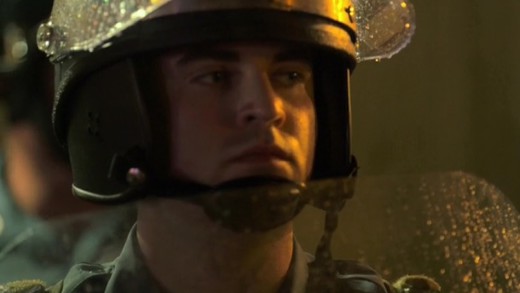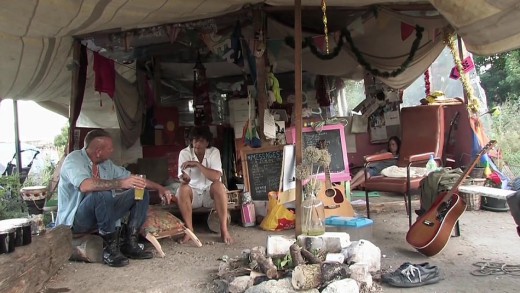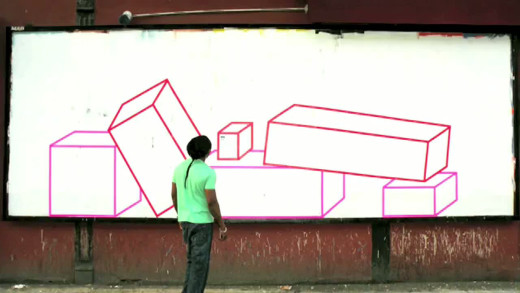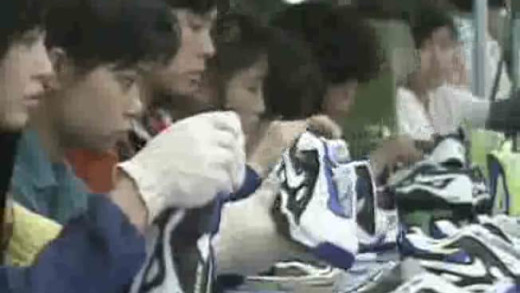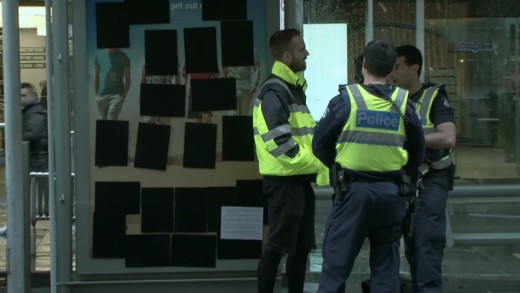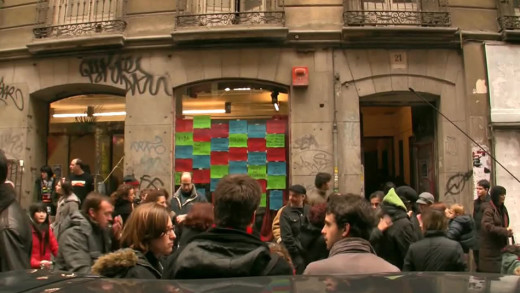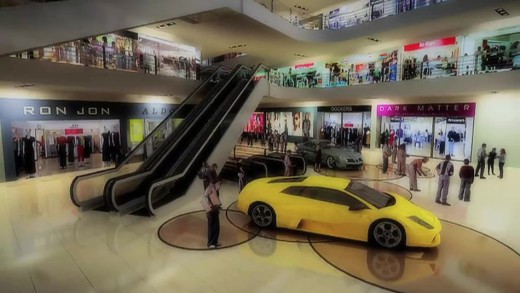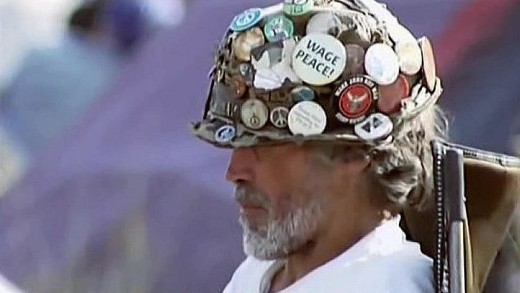Do Not Resist documents, from the perspective of the police, their view of the social unrest following the shooting and killing of Michael Brown by police in Ferguson, 2014, against a backdrop of the routine and escalating use of military tactics and high-powered weaponry by local police forces throughout the United States in the past two decades. Military equipment deployed throughout the Middle East returns home to be used against the citizenry. Local police recruitment and training is awash in military commandments backed by views of escalating 'righteous' violence and sadism. Meanwhile curfews are imposed, along with frivolous drug raids and incessant racial profiling. The voices of concerned citizens ignored. What is the cultural and technological trajectory here?
Two years before the Occupy movement sprang forth in New York, a small group of land-rights activists occupied a piece of disused land in west London to create an "alternative model of moneyless, sustainable living" which they labelled, the Eco-Village. Echoing the dynamics of hippy communes in the United States decades earlier, Grasp the Nettle follows the often bewildering and even amusing actions of this group through many moments of idyllic beauty, as they use local trees and recycled rubbish to build small homes, go dumpster diving, build a manually operated shower and compost toilet, create a local seed bank, and help distribute dumpstered sandwiches to the city's homeless. But the Eco-Village quickly becomes something other than just an idealistic experiment in political protest. It begins to attract vulnerable people who already live on the margins of society and need help: the homeless, the unemployed, alcoholics, the mentally ill. Some of them are invited to stay, but others cause a ruckus and harm the group. Tensions spark as the community grapples to deal with the increasing chaos while trying to stave off the fast-approaching prospect of eviction, through the ideologies of withdrawal, dropping out, freemanism and spirtuality. Grasp the Nettle is hence a valuable reflection of the efficacy of this type of Wandervogel-style activism, where lack of goals and support infrastructure, a diverse array of internal conflicts and horizontal hostility can be the ultimate undoing of idealistic and much-needed political resistance movements.
My Public Space is a short film following a local artist in New York City, documenting the effort to reformat the visual pollution of advertising into public artwork spaces...
No Logo
In the age of the brand, logos are everywhere. But why do some of the world's best-known brands find themselves at the end of spray paint cans and the targets of anti-corporate campaigns? No Logo, based on the best-selling book by Canadian journalist and activist Naomi Klein, reveals the reasons behind the backlash against the increasing economic and cultural reach of multinational companies. Analysing how brands like Nike, The Gap, and Tommy Hilfiger became revered symbols worldwide, Klein argues that globalisation is a process whereby corporations discovered that profits lay not in making products (outsourced to low-wage workers in developing countries), but in creating branded identities people adopt in their lifestyles. Using hundreds of media examples, No Logo shows how the commercial takeover of public space, the restriction of 'choice', and replacement of real jobs with temporary work -- the dynamics of corporate globalisation -- impact everyone, everywhere...
No Measure of Health profiles Kyle Magee, an anti-advertising activist from Melbourne, Australia, who for the past 10 years has been going out into public spaces and covering over for-profit advertising in various ways. The film is a snapshot of his latest approach, which is to black-out advertising panels in protest of the way the media system, which is funded by advertising, is dominated by for-profit interests that have taken over public spaces and discourse. Kyle's view is that real democracy requires a democratic media system, not one funded and controlled by the rich. As this film follows Kyle on a regular day of action, he reflects on fatherhood, democracy, what drives the protest, and his struggle with depression, as we learn that "it is no measure of health to be well adjusted to a profoundly sick society."
In the wake of giant speculative property bubbles and high unemployment, ordinary people are occupying empty buildings in urban areas and turning them into free, open and public space. Communities thrive alongside music and art collectives, concerts, food co-operatives and community gardens. One also finds construction workshops, child care, language classes, political talks and even legal advice on social and economic rights. Okupación focuses in on such community spaces in Madrid, Spain; and follows the fight to keep such spaces alive and open.
The Gruen Effect is a biographical film of Victor Gruen, considered by some to be the grand architect of the modern shopping mall and pedestrian zone. His ideas about urban planning have led to cities that serve the new gods of consumption, developing concepts that have reshaped the modern world. But in perhaps the ultimate of ironies, a naïve Gruen initially envisioned shopping centres as utopian communal spaces that would bring people together. However, developers took these ideas to brood the emergence of suburbia and the new era of consumption that would come to define the post-war world. Viewed with a critical eye, and tracing the path from Gruen's prewar Vienna, to the 1950s America, and back to Europe in 1968, The Gruen Effect can show the themes and translation errors that have come to define intensely colonising urban life, along with a disappointed Gruen appalled at the impact shopping centres have on communities.
War Matters
War Matters chronicles a decade of anti-war protest in Britain through the story of veteran peace campaigner Brian Haw, who camped in Parliament Square for over 10 years in protest against the UK government's policies in the Middle East. Brian began his campaign against war on 2nd June 2001, initially in protest of the sanctions against Iraq. After the September 11 attacks in the United States later on that year, Brian's campaign took on a whole new level of importance. War Matters documents this shift by examining the larger issue of the British arms trade and the repercussions of the Iraq and Afghanistan wars around the world, as civil rights are being curtailed in so-called democracies. Where does democracy end and tyranny begin?
